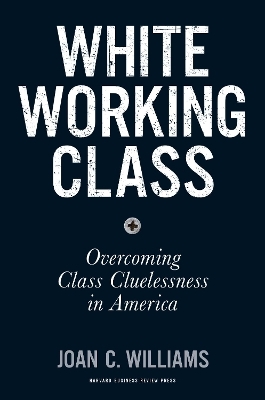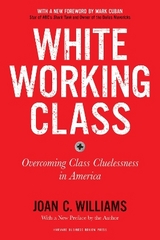
White Working Class
Overcoming Class Cluelessness in America
Seiten
2017
Harvard Business Review Press (Verlag)
978-1-63369-378-4 (ISBN)
Harvard Business Review Press (Verlag)
978-1-63369-378-4 (ISBN)
- Titel z.Zt. nicht lieferbar
- Versandkostenfrei innerhalb Deutschlands
- Auch auf Rechnung
- Verfügbarkeit in der Filiale vor Ort prüfen
- Artikel merken
Zu diesem Artikel existiert eine Nachauflage
Joan C. Williams explains how the term "working class" has been misapplied--it is, in fact, the elusive, purportedly disappearing middle class. This demographic often resents both the poor and the professionals. They don't, however, tend to resent the truly rich, nor are they particularly bothered by income inequality.
Around the world, populist movements are gaining traction among the white working class. Meanwhile, the professional elite--journalists, managers, and establishment politicians--is on the outside looking in, and left to argue over the reasons why. In White Working Class, Joan C. Williams, described as "something approaching rock star status" in her field by the New York Times, explains why so much of the elite's analysis of the white working class is misguided, rooted in assumptions by what she has controversially coined "class cluelessness." Williams explains how most analysts, and the corresponding media coverage, have conflated "working class" with "poor." All too often, white working class motivations have been dismissed as simply racism or xenophobia. Williams explains how the term "working class" has been misapplied--it is, in fact, the elusive, purportedly disappearing middle class. This demographic often resents both the poor and the professionals. They don't, however, tend to resent the truly rich, nor are they particularly bothered by income inequality.
Their dream is not to join the upper middle class, with its different culture, but to stay true to their own values in their own communities--just with more money. White Working Class is a blunt, bracing narrative that sketches a nuanced portrait of millions of people throughout the world who have proven to be a potent political force. For anyone stunned by the rise in populist, nationalist movements, wondering why so many would seemingly vote against their own economic interests or simply feeling like a stranger in their own country, White Working Class will be a convincing primer on how to connect with a crucial set of workers--and voters.
Around the world, populist movements are gaining traction among the white working class. Meanwhile, the professional elite--journalists, managers, and establishment politicians--is on the outside looking in, and left to argue over the reasons why. In White Working Class, Joan C. Williams, described as "something approaching rock star status" in her field by the New York Times, explains why so much of the elite's analysis of the white working class is misguided, rooted in assumptions by what she has controversially coined "class cluelessness." Williams explains how most analysts, and the corresponding media coverage, have conflated "working class" with "poor." All too often, white working class motivations have been dismissed as simply racism or xenophobia. Williams explains how the term "working class" has been misapplied--it is, in fact, the elusive, purportedly disappearing middle class. This demographic often resents both the poor and the professionals. They don't, however, tend to resent the truly rich, nor are they particularly bothered by income inequality.
Their dream is not to join the upper middle class, with its different culture, but to stay true to their own values in their own communities--just with more money. White Working Class is a blunt, bracing narrative that sketches a nuanced portrait of millions of people throughout the world who have proven to be a potent political force. For anyone stunned by the rise in populist, nationalist movements, wondering why so many would seemingly vote against their own economic interests or simply feeling like a stranger in their own country, White Working Class will be a convincing primer on how to connect with a crucial set of workers--and voters.
Joan C. Williams is Distinguished Professor of Law and Hastings Foundation Chair at the University of California, Hastings College of the Law. Williams’s work includes What Works for Women at Work, coauthored with Rachel Dempsey (New York University Press, 2014); Unbending Gender: Why Family and Work Conflict and What To Do About It (Oxford University Press, 2000); and such widely read reports as “The Three Faces of Work-Family Conflict,” coauthored with Heather Boushey. Williams is frequently featured as an expert on social class. For more information, visit JoanCWilliams.com.
| Erscheinungsdatum | 24.05.2017 |
|---|---|
| Zusatzinfo | Illustrations |
| Sprache | englisch |
| Maße | 139 x 209 mm |
| Gewicht | 272 g |
| Themenwelt | Sozialwissenschaften ► Politik / Verwaltung ► Politische Systeme |
| Sozialwissenschaften ► Soziologie ► Makrosoziologie | |
| Wirtschaft ► Volkswirtschaftslehre ► Makroökonomie | |
| ISBN-10 | 1-63369-378-3 / 1633693783 |
| ISBN-13 | 978-1-63369-378-4 / 9781633693784 |
| Zustand | Neuware |
| Haben Sie eine Frage zum Produkt? |
Mehr entdecken
aus dem Bereich
aus dem Bereich
über Alltagsorte des sozialen Zusammenhalts
Buch | Softcover (2024)
transcript (Verlag)
24,00 €



